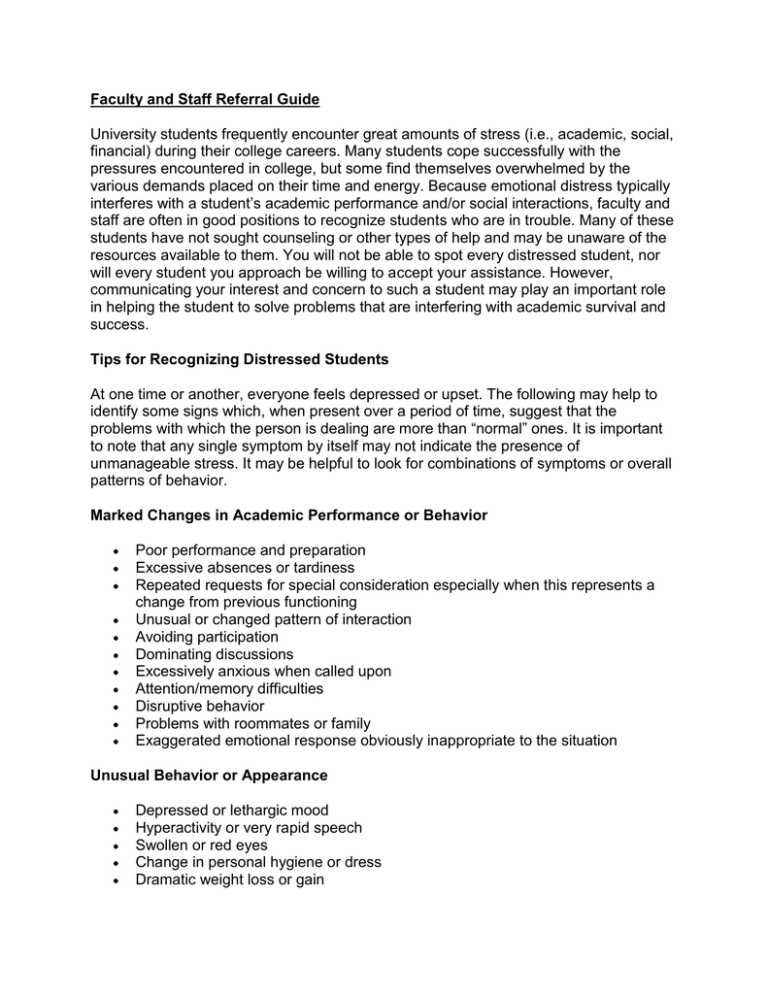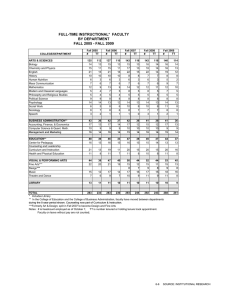Faculty and Staff Referral Guide
advertisement

Faculty and Staff Referral Guide University students frequently encounter great amounts of stress (i.e., academic, social, financial) during their college careers. Many students cope successfully with the pressures encountered in college, but some find themselves overwhelmed by the various demands placed on their time and energy. Because emotional distress typically interferes with a student’s academic performance and/or social interactions, faculty and staff are often in good positions to recognize students who are in trouble. Many of these students have not sought counseling or other types of help and may be unaware of the resources available to them. You will not be able to spot every distressed student, nor will every student you approach be willing to accept your assistance. However, communicating your interest and concern to such a student may play an important role in helping the student to solve problems that are interfering with academic survival and success. Tips for Recognizing Distressed Students At one time or another, everyone feels depressed or upset. The following may help to identify some signs which, when present over a period of time, suggest that the problems with which the person is dealing are more than “normal” ones. It is important to note that any single symptom by itself may not indicate the presence of unmanageable stress. It may be helpful to look for combinations of symptoms or overall patterns of behavior. Marked Changes in Academic Performance or Behavior Poor performance and preparation Excessive absences or tardiness Repeated requests for special consideration especially when this represents a change from previous functioning Unusual or changed pattern of interaction Avoiding participation Dominating discussions Excessively anxious when called upon Attention/memory difficulties Disruptive behavior Problems with roommates or family Exaggerated emotional response obviously inappropriate to the situation Unusual Behavior or Appearance Depressed or lethargic mood Hyperactivity or very rapid speech Swollen or red eyes Change in personal hygiene or dress Dramatic weight loss or gain Strange or bizarre behavior indicating loss of contact with reality Abrupt or radical changes in behavior Overuse or regular use of illicit drugs, alcohol, and/or medication (without medical monitoring) References to Suicide, Homicide or Death Feelings of helplessness or hopelessness Overt references to suicide Isolation from friends or family Homicidal threats References to any of the above may occur in students’ verbal or written statements. When to Refer Even though you may be genuinely concerned about students and interested in helping them, you may find yourself in situations where it would be better to refer the student to other resources. A referral is usually indicated in the following situations: The problem is more serious than you feel comfortable or capable of dealing with. You are extremely busy or experiencing stress in your own life and are unable or unwilling to handle other requests for help. You have talked to the student and helped as much as you can, but further assistance is needed. You think your personal feelings about the student will interfere with your objectivity . The student admits that there is a problem but doesn’t want to talk to you about it. The student asks for information or assistance which you are unable to provide. If you have questions about a student’s behavior or the appropriateness of a referral for counseling, you may call the Counseling Center (342-5220) and ask to speak to a counselor about ways to proceed with the student. Please note that we are not in a position to make a judgment concerning the validity of concerns such as poor concentration, inability to attend class or take exams, or requests for an “Incomplete” grade. Persons who have ongoing contact with a student are in a better position to make decisions about the academic work of the student than the Counseling Center, where we may only see the student for a single initial appointment. In certain cases where we have seen a student for individual counseling over an extended period of time, we may be able to make recommendations. How to Refer When you have determined that a student might benefit from professional counseling, it is usually best to present your suggestion for counseling in a non-threatening way. Express your concern directly to the student, including why you’re concerned and why you think counseling might be helpful. Be specific regarding the behaviors that have raised your concerns and avoid making generalizations about the individual. For many students there is a stigma attached to seeking help from a professional and they may interpret your referral as a comment about the severity of their problem. Reassure them that counselors work with people who have a wide range of concerns (e.g., relationship problems, depression, stress, etc.) and that seeking such help is a sign of strength and courage rather than a sign of weakness or failure. It may be helpful to point out that seeking professional help for other problems (e.g., medical, legal, or car problems) is considered good judgment and an appropriate use of resources. It may also help them to know that they do not have to be able to pinpoint what is wrong before they seek assistance. For a formal referral, download and complete the “Non-Emergency Referral Form.” Fax a copy of the form to the Counseling Center (342-5228) and provide the student with a copy to present to the receptionist when making the appointment. Except in emergencies, the option must be left open for the student to accept or refuse counseling. If the student is skeptical or reluctant to pursue counseling for whatever reason, simply express your acceptance of those feelings so that your own relationship with the student is not jeopardized. Give the student an opportunity to consider other alternatives by suggesting that he or she might need some time to think it over. If the student still refuses to seek counseling, then respect that decision, and again leave the door open for possible reconsideration at a later time. In an emergency situation, call the Counseling Center (342-5220) and ask to speak to a counselor immediately. Suicidal intent, acute risk of violent behavior, severe loss of emotional control and gross impairment in thinking ability are examples of emergencies. If an emergency occurs after 5 p.m., Monday through Thursday, after 11:30 on Friday, or on a weekend, please contact the University Police Department by dialing 1-911 from any campus phone or 342-5350 from any phone. Inform UPD of the emergency and they will notify a counselor and/or respond accordingly. If the student accepts your referral, proceed with steps to link him/her to the Counseling Center. It is important that referrals be made to the Center and not to a particular counselor because students usually become disappointed if the counselor whose name they have been given is not immediately available or has a full caseload and is unable to accept new clients. Initiation of Counseling Center Services Students may access our services by coming to the Counseling Center (1140 University Avenue) or calling 342-5220 to make an initial consultation appointment. Students provide Counseling Center staff with their referral form at this time. Students whose class schedules prohibit them from coming at one of those times may arrange for an initial consultation at a more suitable time. During the initial consultation, your student will meet with a staff counselor to determine how the Counseling Center can best meet your student’s needs. Following the initial consultation, the counselor will make recommendations regarding the most appropriate course of treatment based on their assessment (i.e., additional individual counseling, referral to a more appropriate resource). As a faculty/staff member, your role in facilitating the initiation of services may vary based on the situation. In some instances, it is appropriate simply to direct the student to the Counseling Center. If you judge the situation to be urgent, it is appropriate to call the Counseling Center, inform the receptionist that you are referring a student who needs to be seen right away, and ask to speak to a counselor to provide further information about your concerns. A student can then usually be seen within several hours; students in crisis are seen immediately on an emergency basis. Sometimes it may be useful or necessary for you to walk the student over to the Counseling Center. Finally, after you have referred the student, follow up with him/her to show your continued support. All contacts/visits with the Counseling Center are confidential; therefore, information regarding a student cannot be released to you without a student’s written permission. However, if you believe that it is vital for you to learn whether the student came to the Counseling Center, ask the student to sign a release of information that confirms their visit. The Non-Emergency Referral Form provides an opportunity for the student to release this information or the student can give the counselor permission to confirm their attendance by signing a Release of Information Form in the office.


